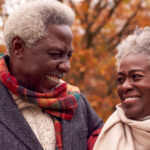

Whenever friends and clients ask me to recommend a couples weekend workshop, I always refer them to the Art and Science of Love, a couples workshop developed by the world-famous Gottman Institute.
Why? It is the highest quality couples weekend workshop with methods and concepts entirely based on sound, reliable research. There are “light” versions of the Gottman couples workshop, and workshops based on other research, but none with standards as rigorous as the Art and Science of Love, a couples workshop.
Gottman researchers studied thousands of couples; observed which behaviors led to lasting, happy relationships; then tracked the couples, some for up to 20 years. After identifying the common behaviors of couples who remained happily married, Gottman scientists and marriage therapists created methods to teach couples how to develop and maintain those behaviors.
For example, Gottman researchers discovered that one vital “happily married” behavior was being able to listen to your partner’s complaints without interfering and without attempting to defend yourself. Researchers identified this behavior as “self-soothing,” meaning partners are able to calm themselves and stay engaged in the conversation. At the Art and Science of Love, couples learn methods of self-soothing, and then practice the skills while discussing a subject that often brings contention to their relationship.
Gottman-trained therapists are on-hand to help couples with the exercises as needed.
Disclaimer: I am a Certified Gottman Therapist and presenter of the Art and Science of Love in the Denver area. I opted to become a Certified Gottman Therapist and presenter after much study of various weekend workshops. I would want the best for myself and my relationship and nothing short, so I offer the best.
The two-day workshop is known as “the fastest way to a happier relationship” because attendees say they see immediate results, as well as long lasting results.
Couples who attend the Art and Science of Love say they find themselves firmly on the path toward:
• Sharing intimate moments every day with their partner.
• Looking forward to spending time together, rather than feeling like they’re “doing time.”
• Being in a relationship in which both see an extraordinary future together.
• Feeling respected and honored when you share your ideas and desires.
• Experiencing the joy of being yourself and knowing you are accepted and loved by your partner.
• Moving past mundane sex and, instead, enjoying fun and exciting intimacy.?
Other attendees of my workshop have said:
• “Learned how to better plan out the life dreams and make it happen now!”
• “SO, SO helpful. We realized the core of our perpetual problem … . I physically [feel] lighter – I got a huge weight lifted off. I’m feeling hopeful about the future. THANK YOU!!!!” • “I feel that I’m coming away with some solid skills to improve my communication with my spouse.”
Find a Certified Gottman Therapist today and begin your journey toward a healthier, happier, lasting relationship.
In Gottman’s terminology, romance is an opportunity to not only turn towards your partner but also to share fondness and admiration and your knowledge of their love maps.
To put it simply, it is a chance to show up for your partner, to demonstrate that you know and understand them deeply and that you care about them. If that’s the feeling you get when your partner is around, emotional connection, trust, and sometimes even physical connection will follow.
First off, you need to know your partner. Are rom-coms cheesy or cute to them? Do they find love songs sappy or sweet? While all gestures are appreciated as thoughtful, you want to try to hit the bullseye on the target, so it feels romantic. Try asking and answering the following questions:
-What movies or shows do you find romantic? Why? What parts?
-What sorts of things (words, actions, gifts, etc.) feel romantic to you?
-What is the most romantic moment you remember having? What made it so romantic?
-What romantic things does your partner do that you see and appreciate now?
-Name one romantic gesture that would mean a lot for your partner to give you.
Planning something romantic sounds daunting to many, so it may be difficult to know where to begin. It doesn’t have to be anything grand. Think of a normal thing you would do, then ask yourself: how can I take this one step further? For example, you are going out to dinner like you do every Friday. To take it one step further, you could plan to go somewhere new, recreate the first date, plan something fun after dinner, show up with flowers beforehand, feed your partner bites of dessert, or suggest taking a loved-up photo. By giving these examples, you can see how knowing your partner is so important.






